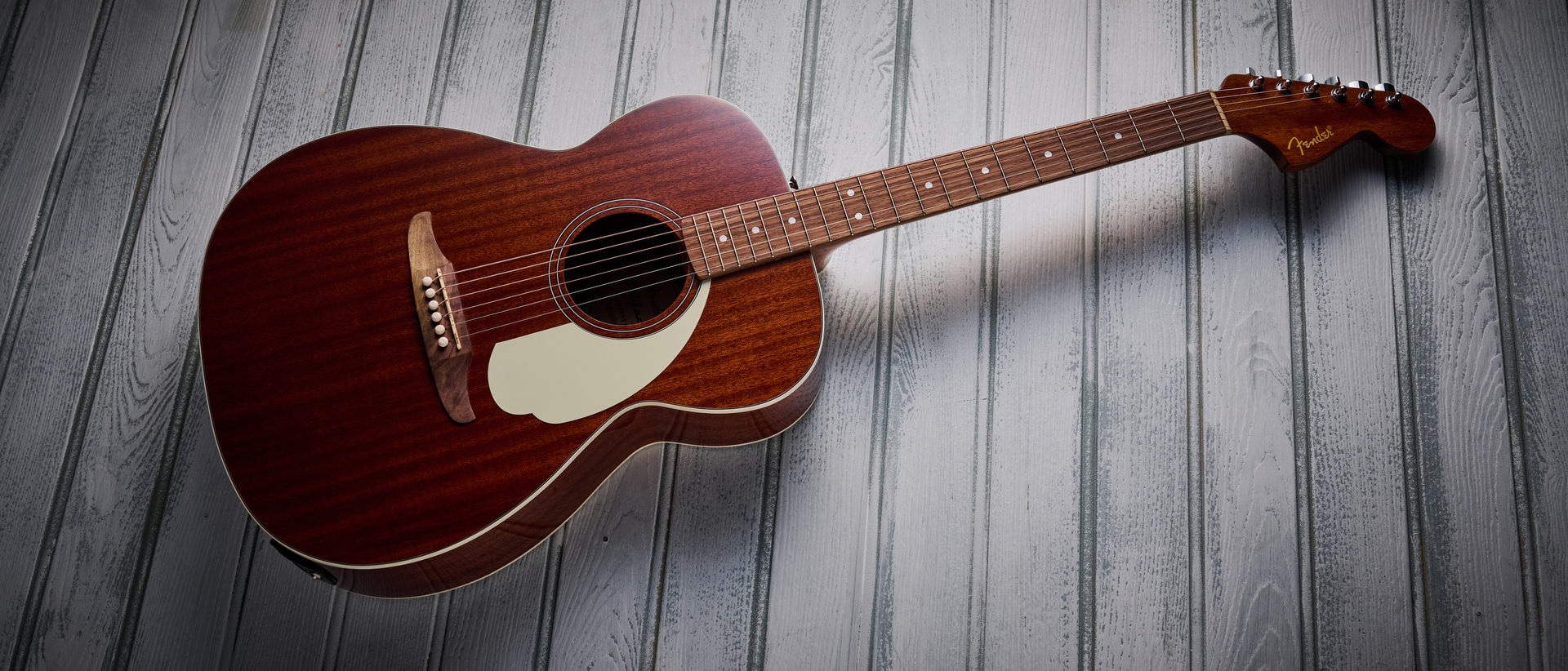Best microphones for recording guitar 2025: top mics for recording acoustic and electric guitar
Our pick of the best microphones for recording guitar, both acoustic and electric, with top-rated guitar mics from the likes of Shure, AKG and Sennheiser
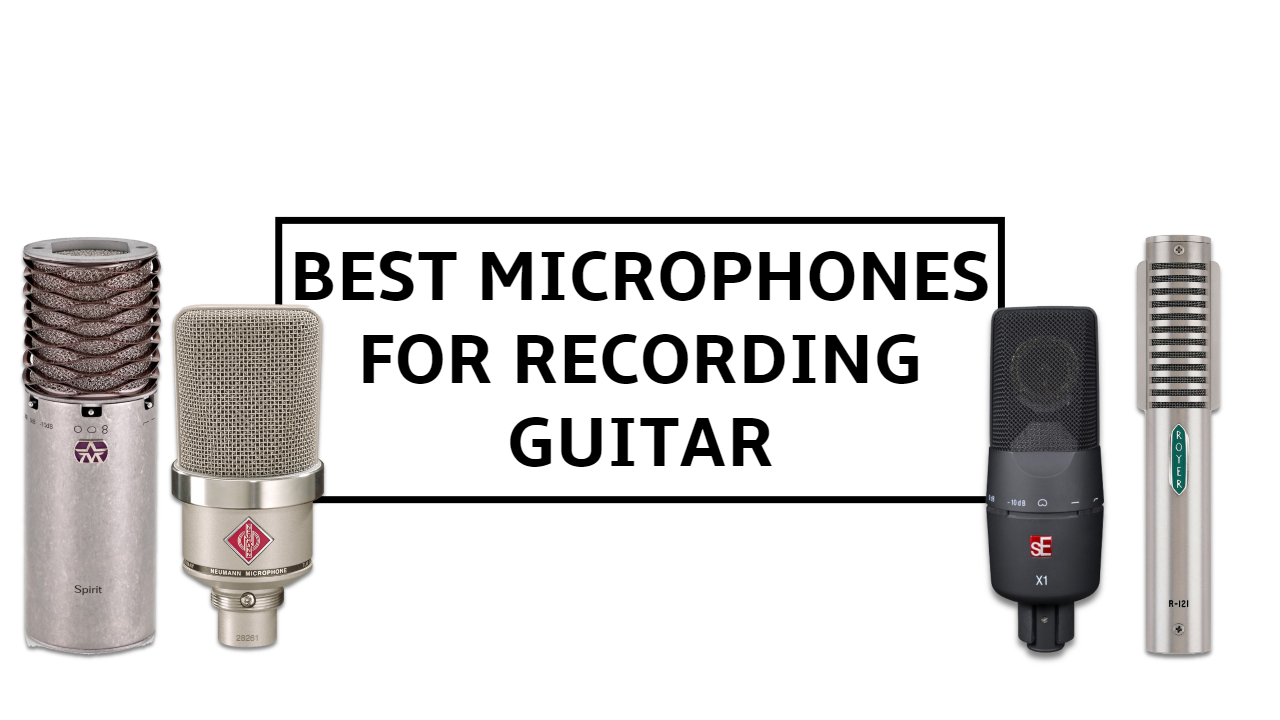
If you’re searching for the best microphones for recording guitar, we can only assume that you’re looking to record yourself playing, whether that’s at home or in the studio. Recording the guitar brings with it a special set of considerations, and there are certain tricks required to ensure your instrument sounds as good as it possibly can.
Chief among these is choosing the microphones that you can afford, and happily you don’t have to spend a fortune to take home a great guitar mic. In this guide we’ll outline the top-rated microphones for recording guitars, across a range of different applications and recording situations.
From carefully placed condenser microphones charged with picking up every nuance of your acoustic guitar, to tough dynamic mics which can withstand the full force of a raging amp cabinet and electric guitar, we have options for everything and then some.
- Our pick of the best laptops for music production and guitar recording
- Go deeper with out pick of the best acoustic guitar microphones
- Here is our choice of the best guitar amps for recording
- New to playing? Try the best acoustic guitars for beginners…
- …Or turn up the rock with the best beginner electric guitars
Best microphones for recording guitar: Our top picks
Ask any guitarist about a microphone for recording and, as quick as the synapses fire, they’ll likely declare that the Shure SM57 is the best microphone for recording guitar. There are many reasons why it’s still regarded as a top-rated guitar mic, and it’s rare that people regret stocking at least one in their arsenal of recording gear.
There are, however, different options for different scenarios. We’d advocate doubling up, particularly for electric guitar amps, and combining a dynamic mic like the Shure SM57 with a more sensitive condenser.
Elsewhere, the Aston Spirit impresses us every time we use it, making it easy to recommend, while the impressive results and versatility from the AKG C414 XLII make it one of the best microphones for recording guitar in any studio.
Best microphones for recording guitar: Product guide
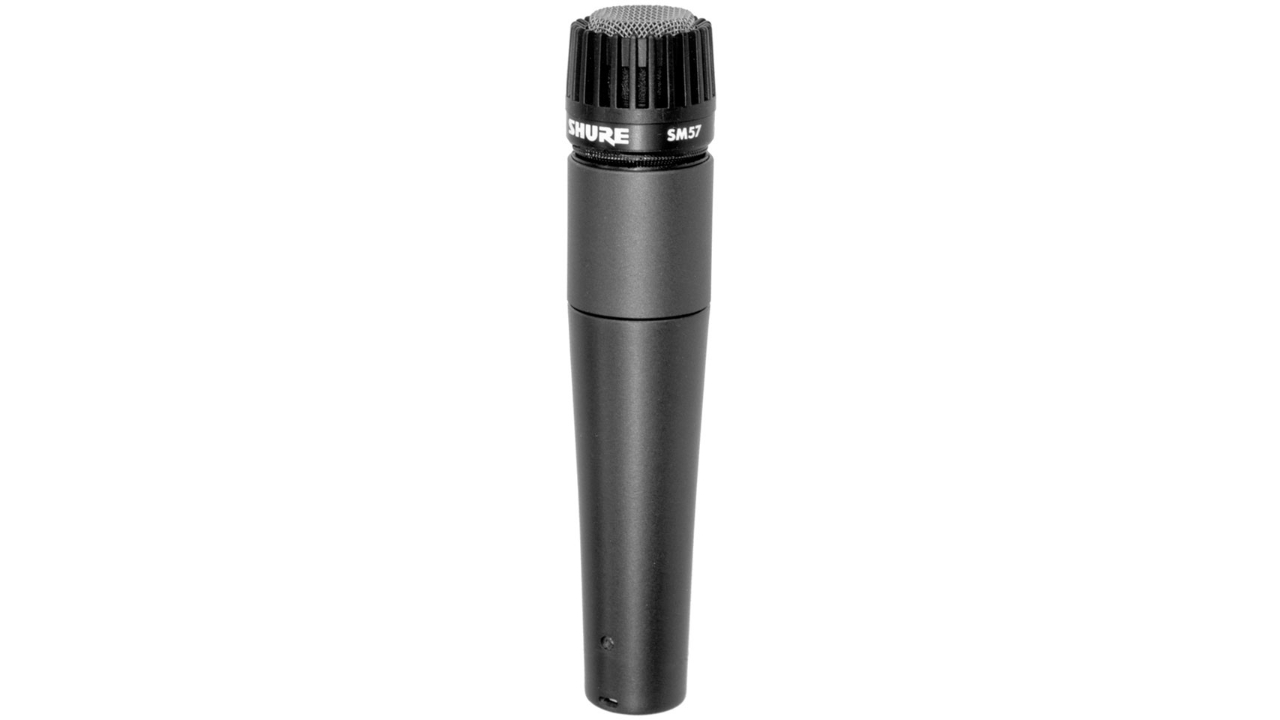
1. Shure SM57 Dynamic Microphone
Our expert review:
Specifications
Reasons to buy
Reasons to avoid
If we didn’t include the Shure SM57 in a list of the best microphones for recording guitar we’d be hounded out of town… And with good reason too. The jack-of-all-trades dynamic mic is the perfect partner for recording electric guitar, as it allows you to record at essentially stage volumes without any loss of clarity. Its cardioid pickup pattern is great for isolating the sound you want, and it is as tough as old boots too.
We also love the Shure SM57 Microphone for its versatility. Far from being ‘just’ an electric axe specialist, this mic is just at home working with acoustics, drums, bass guitars and vocals too, and is happy transferring its skill-set between the studio and the stage. The best microphone for recording guitar bar none.
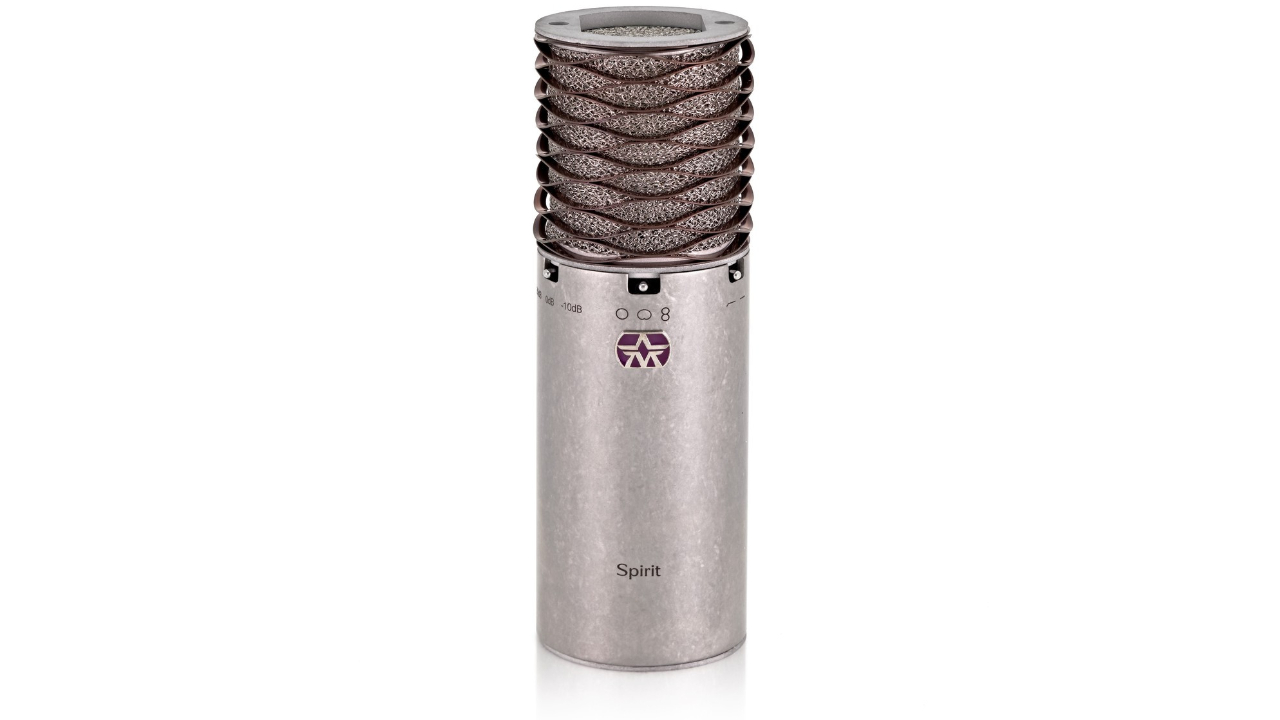
2. Aston Spirit Condenser Microphone
Our expert review:
Specifications
Reasons to buy
Reasons to avoid
British mic brand Aston has been cooking up a storm over the past few years, releasing a range of different mics which have universally impressed us. The Aston Spirit is its flagship condenser microphone, delivering superb recording performance and exceptional build quality at a price which nobody else in the sector can beat.
The Aston Spirit is so well constructed that you can drop it, bash it around and generally give no further thought to its well-being and it will continue to perform. This is thanks to features like the unique mesh head which, if subjected to a drop or ding, will simply fold up to protect the valuable internals. It also has an in-built pop filter and shockmount, making it ready for anything you can throw at it.
- The best guitar audio interfaces for recording at home
- Get creative with the best looper pedals
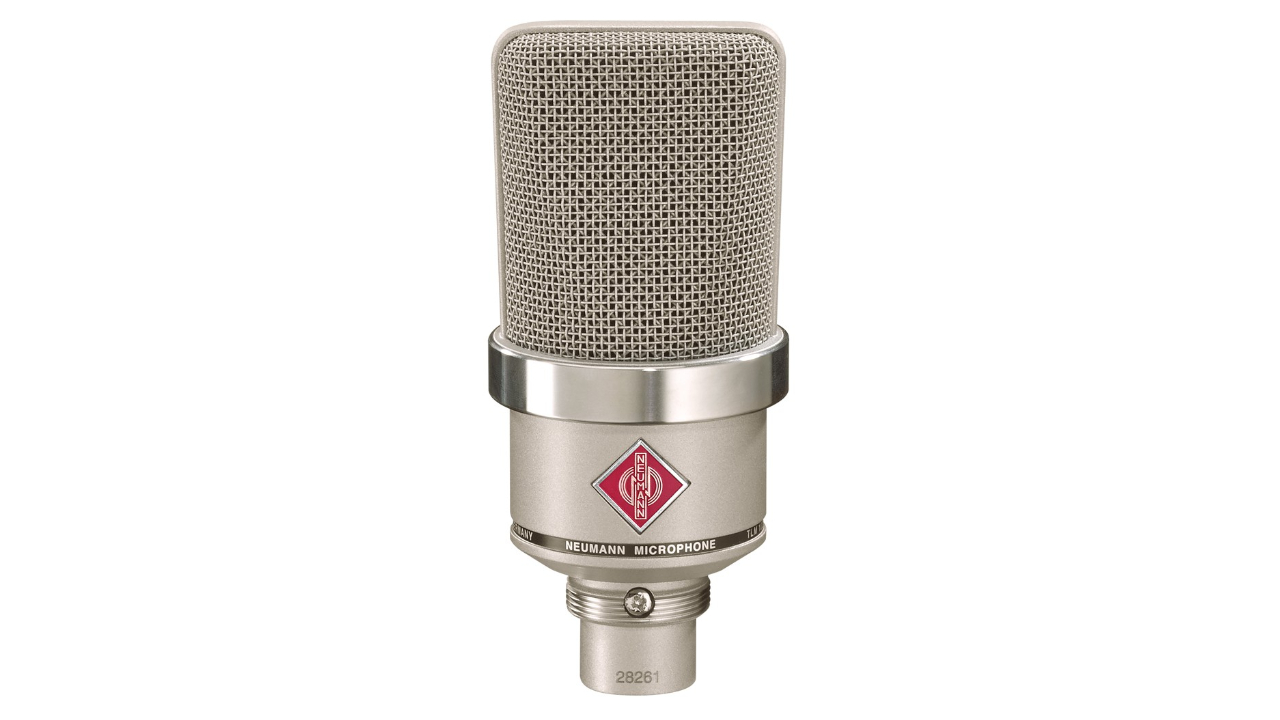
3. Neumann TLM-102 Microphone
Our expert review:
Specifications
Reasons to buy
Reasons to avoid
Sitting at the upper-to-middle price bracket, the Neumann TLM-102 is one of the best microphones for recording guitar for anyone looking to hone their recording craft. As a large-diaphragm condenser, the TLM-102 is great at acoustic guitars and vocals, with a slight boost at 6kHz adding some extra sparkle.
That said, the Neumann TLM-102 Microphone has also been engineered to withstand high sound pressure levels (SPLs) so it’s not averse to being propped up in front of a guitar cabinet.
We like its compact form factor too, and have had great results using a TLM-102 in conjunction with a dynamic mic to provide a wider tonal palette when it comes to mixing. If you want a compact option with bags of character, this Neumann is the best microphone for recording guitar for your needs.
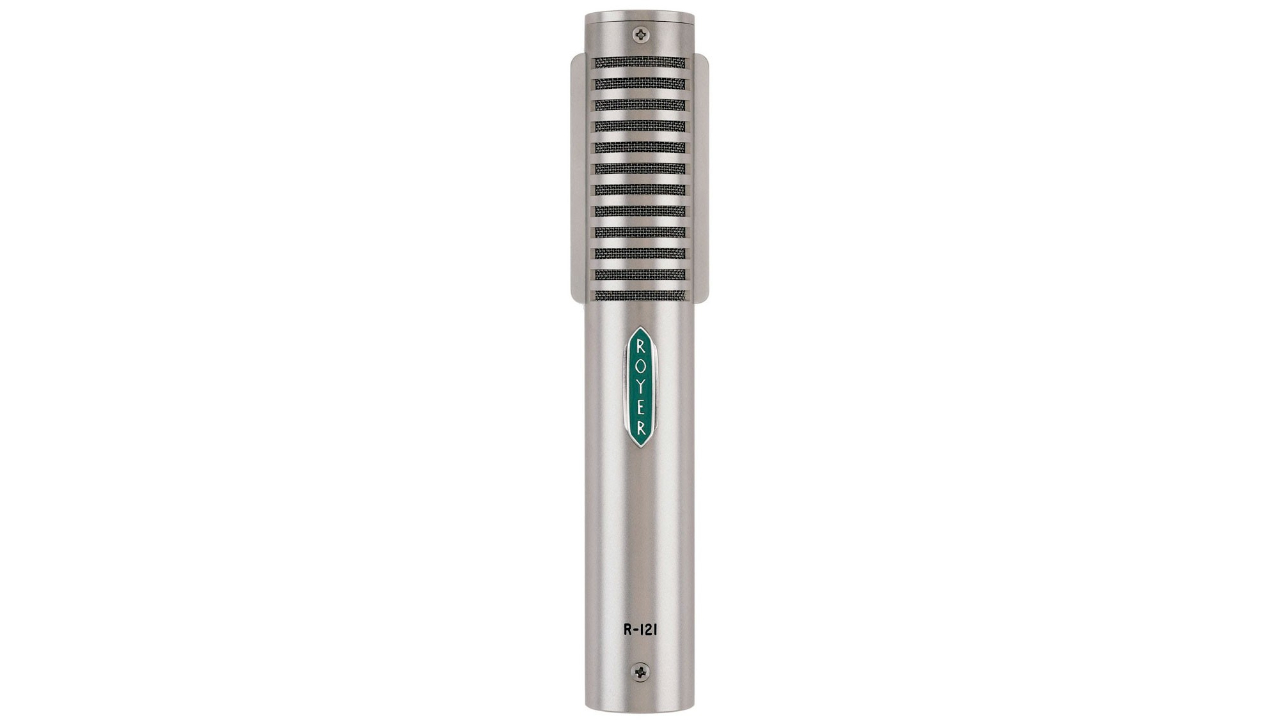
4. Royer Labs R-121 Ribbon Microphone
Our expert review:
Specifications
Reasons to buy
Reasons to avoid
Ribbon mics are traditionally treated with care, due to their fragile nature. They’re like the special team you wheel out for very specific use cases. Nobody told Royer Labs that though, as the R-121 Microphone has been designed to combine the best tonal elements of a ribbon mic with the durability and toughness of a dynamic.
The Royer Labs R-121 is exceptionally robust and can handle high SPL recordings, making it perfect for guitar cabinets. We found combining the high end of an SM57, with the low end of the R-121 gave astounding results. It’s not a cheap mic by any means, but it may just revolutionise your recordings.
- Get secure with best guitar straps
- Invest in the best guitar cables for acoustic and electric
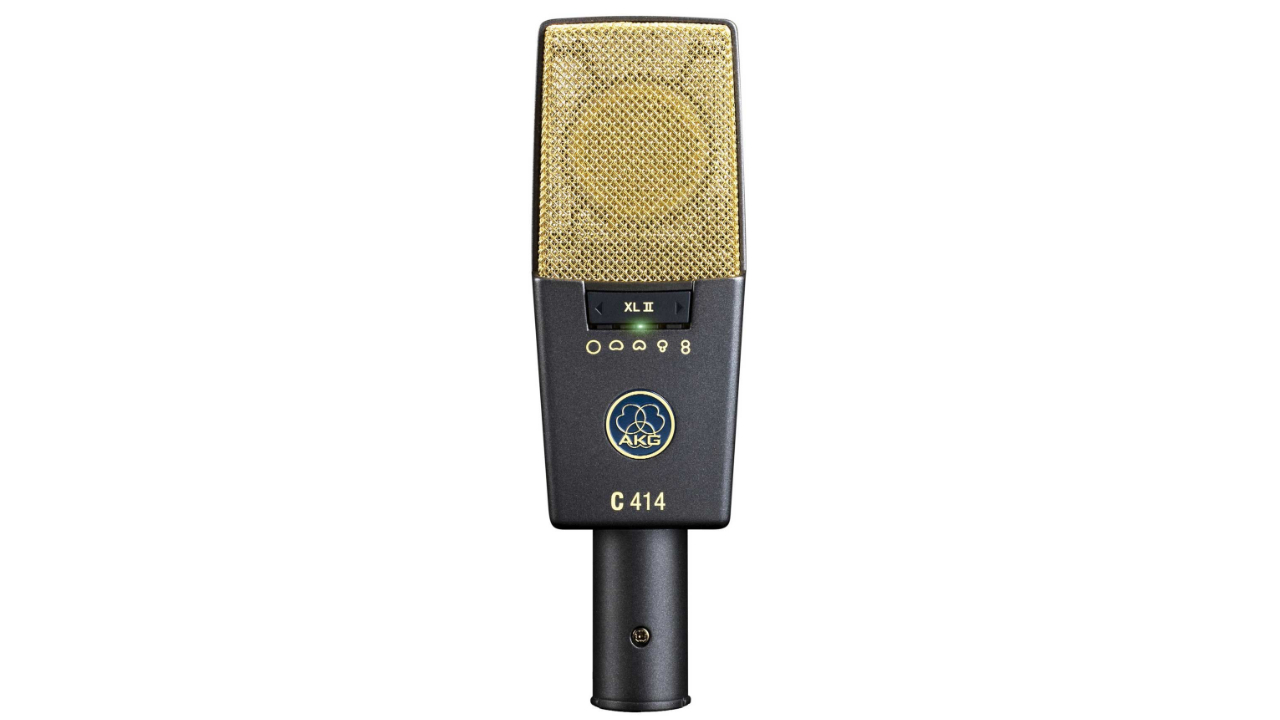
5. AKG C414 XLII Condenser Microphone
Our expert review:
Specifications
Reasons to buy
Reasons to avoid
AKG is condenser mic royalty, and with the AKG C414 XLII Microphone it’s easy to see why. As a studio tool, it’s near indispensable thanks to its multiple pickup patterns and different attenuation and filtering options available on the mic itself.
This makes the AKG C414 XLII ideal for recording all kinds of guitar sounds and techniques, while the dynamic range you’d expect from a high-quality condenser remains untroubled. We like the fact that it comes complete as a package with a shockmount and pop/wind shields, making it one of the best bundles in its price range.
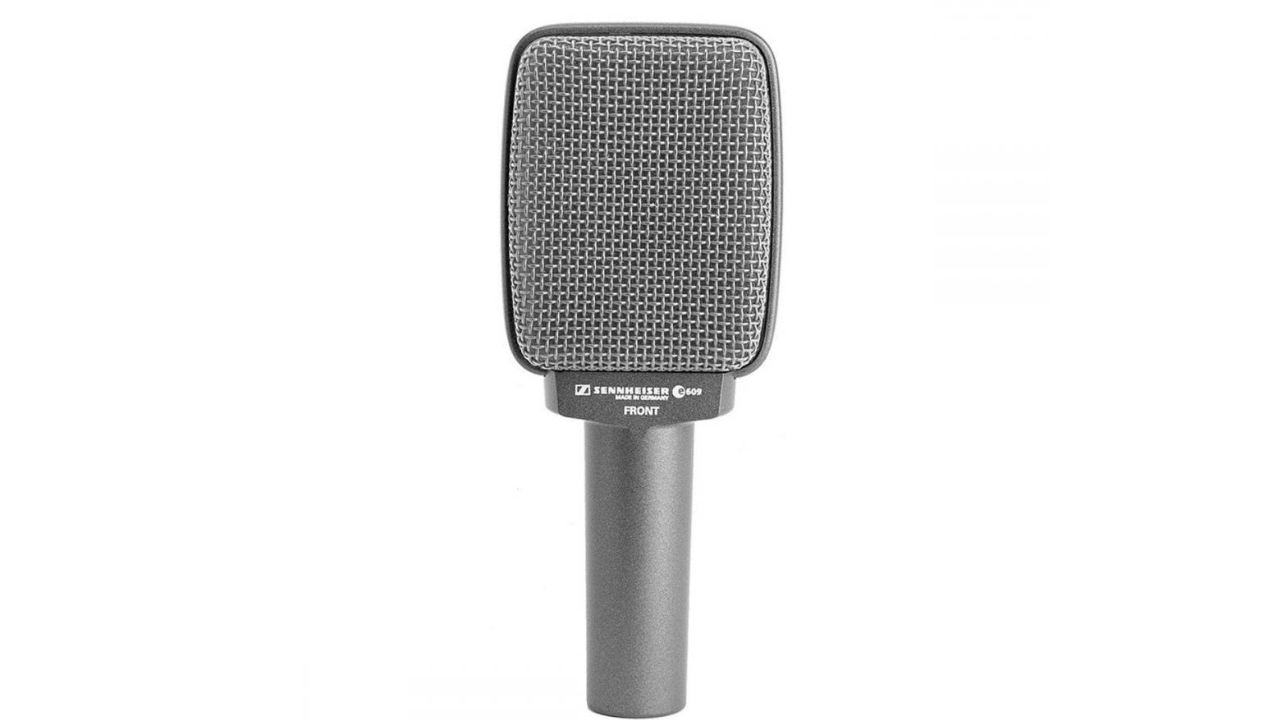
6. Sennheiser e609 Silver Guitar Microphone
Our expert review:
Specifications
Reasons to buy
Reasons to avoid
The Sennheiser e609 Microphone has been made specifically for recording guitar amps, going as far as to remove the need for a dedicated mic stand. Instead, you simply drape the e609 over the top of the amp towards the speaker cone, and there it will happily sit picking up sounds at any volume you care to reach towards.
The supercardioid pickup patterns ensures the microphone will only record exactly what’s coming out of the speakers with no bleed or feedback too. It doesn’t have the widest frequency range, and there are certainly better ‘sounding’ microphones for more delicate play styles, but for rock and metal players who need something quick and inexpensive, the Sennheiser e609 is ideal.
- Organize your effects with the best pedalboards
- Practice quietly with the best headphones for guitar amps
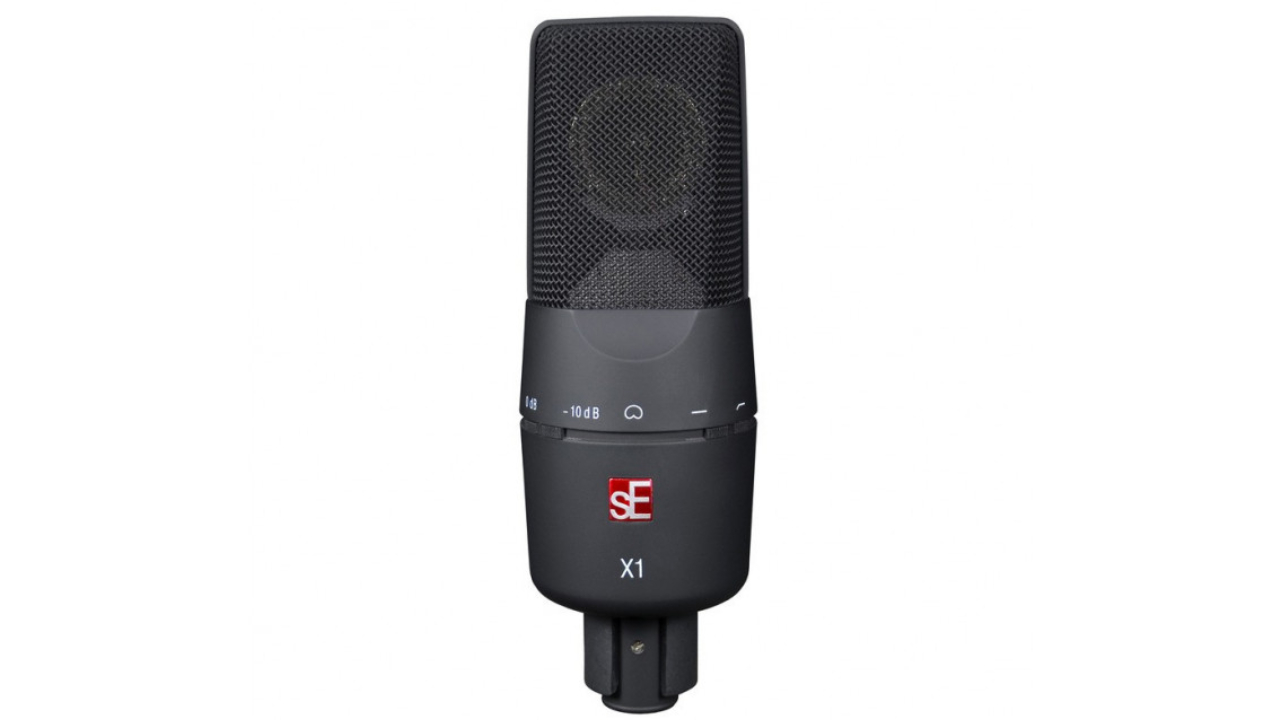
7. sE Electronics X1A Condenser Microphone
Our expert review:
Specifications
Reasons to buy
Reasons to avoid
Introduced in 2011, the sE Electronics X1 is one of the best-regarded condenser microphones in the entry-level bracket. While it’s possible to use USB condenser mics like the Blue Yeti for recording instruments, many home studio enthusiasts quickly find they prefer the versatility of using a traditional XLR microphone and the X1 is the first choice for many players.
The sE Electronics X1 Microphone boasts a wide frequency response, making it ideal for acoustic guitars and vocals, while an in-built attenuation pad means it’ll handle guitar cabinets equally well. For the price, there’s not a lot wrong with the X1.
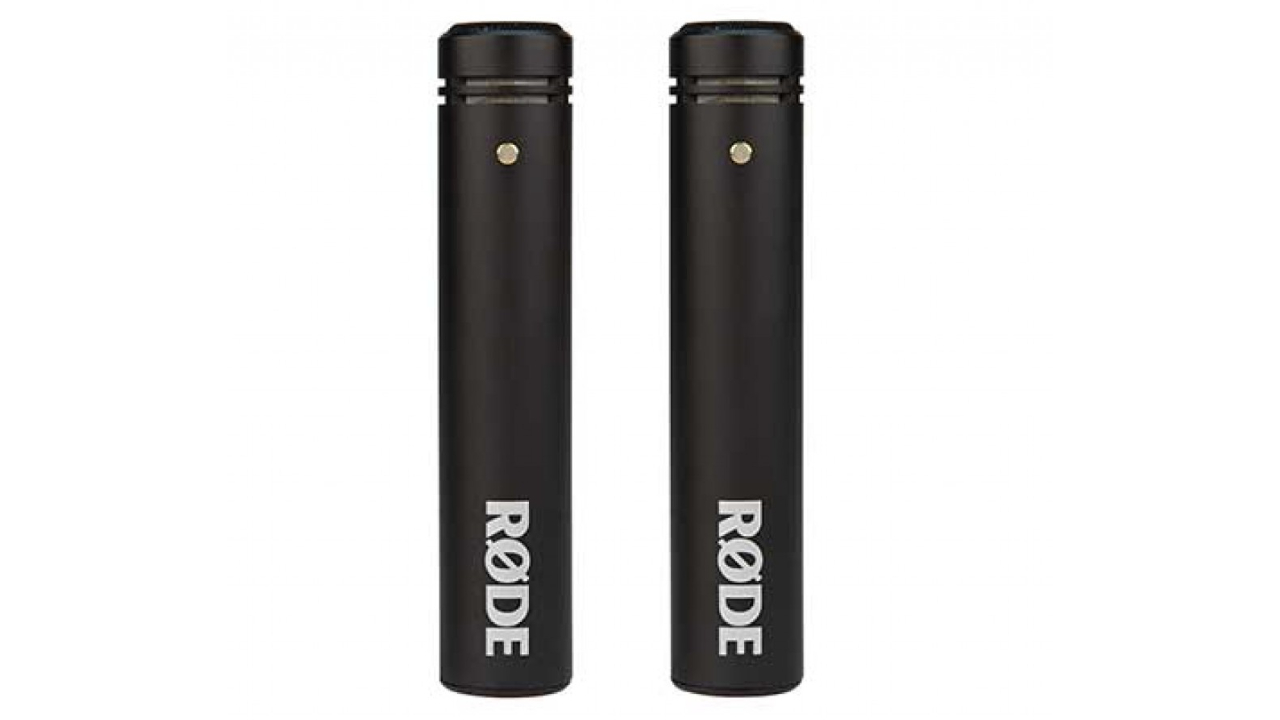
8. Rode M5-MP Condenser Microphones
Our expert review:
Specifications
Reasons to buy
Reasons to avoid
It’s often preferable, when recording acoustic guitars, to employ more than one microphone for the task. While the majority of the sound will come from the guitar’s body, there are also fine details around the fingerboard which can elevate a recording into something much richer.
The Rode M5-MP ( MP stands for matched pair) is a set of two compact condenser microphones which excel at picking up these extra nuances. You simply point one towards the soundhole and the other towards the neck and will achieve great results.
Their small size means they won’t get in the way of your playing, and you might be surprised how much extra detail and stereo width you gain from your recordings. You won’t, it must be said, find much use with electric guitars unless you use them for room ambience, but the Rode M5-MP set is cheap enough that it’s worth keeping a set on hand just in case.
Best microphones for recording guitar: Buying advice
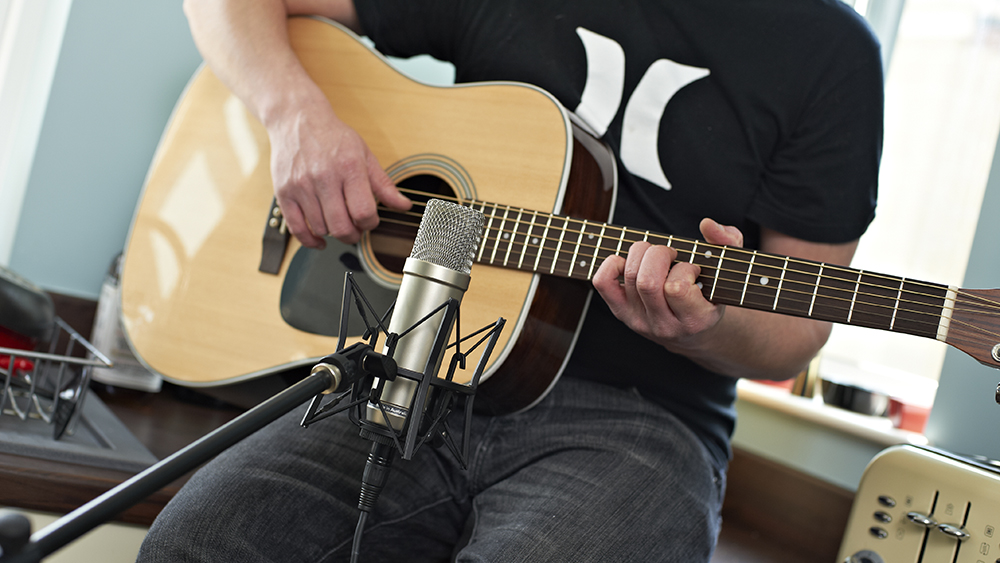
Typically, there are a few things to consider when choosing from among the best microphones for recording guitars. First is the situation you’ll be using the microphone in. Studio and stage bring different requirements and may therefore require different choices. Likewise, you would possibly employ a different type of microphone for recording an acoustic than you would an electric.
The two major types of microphones for recording guitar covered here are dynamic and condenser. There are also ribbon mics, which yield incredible sonic results but this is reflected in their sky-high price. Dynamic microphones contain no moving parts, and can withstand much higher volumes without losing fidelity. This makes them the best microphones for recording guitar if you want a mic to place in front of loud tube amps, which need volume to unlock their true harmonic potential.
Dynamic mics tend to have a tighter pickup pattern – more on this shortly – which makes them ideal for concentrated, focused sound capture. Condenser microphones, on the other hand, are more delicate but their method of capturing sound enables them to pick up much more in the way of fine detail.
As mentioned, a microphone’s pickup (or polar) pattern is a crucial component of how they operate. Cardioid, or super-cardioid, means the microphone registers only what is placed directly in front of it, rejecting sounds coming from outside that specific axis.
Omni and bi-directional pickup patterns work, as you expect, by registering sounds from a wider area. In the studio, for example, you might want some of the natural reverb from the space in which you’re recording incorporated into the overall results and an omni-directional mic will allow for this. Let’s take a look at the top picks for the best microphones for recording guitars now.
Related buyer's guides
You can trust Guitar World
- Best DAWs for guitarists: guitar-friendly music-making software
- Raise hell with the best metal guitars for all budgets
- Or save big with the best cheap electric guitars under $500
All the latest guitar news, interviews, lessons, reviews, deals and more, direct to your inbox!
Chris Corfield is a journalist with over 12 years of experience writing for some of the music world's biggest brands including Orange Amplification, MusicRadar, Guitar World, Total Guitar and Dawsons Music. Chris loves getting nerdy about everything from guitar gear and synths, to microphones and music production hardware.

